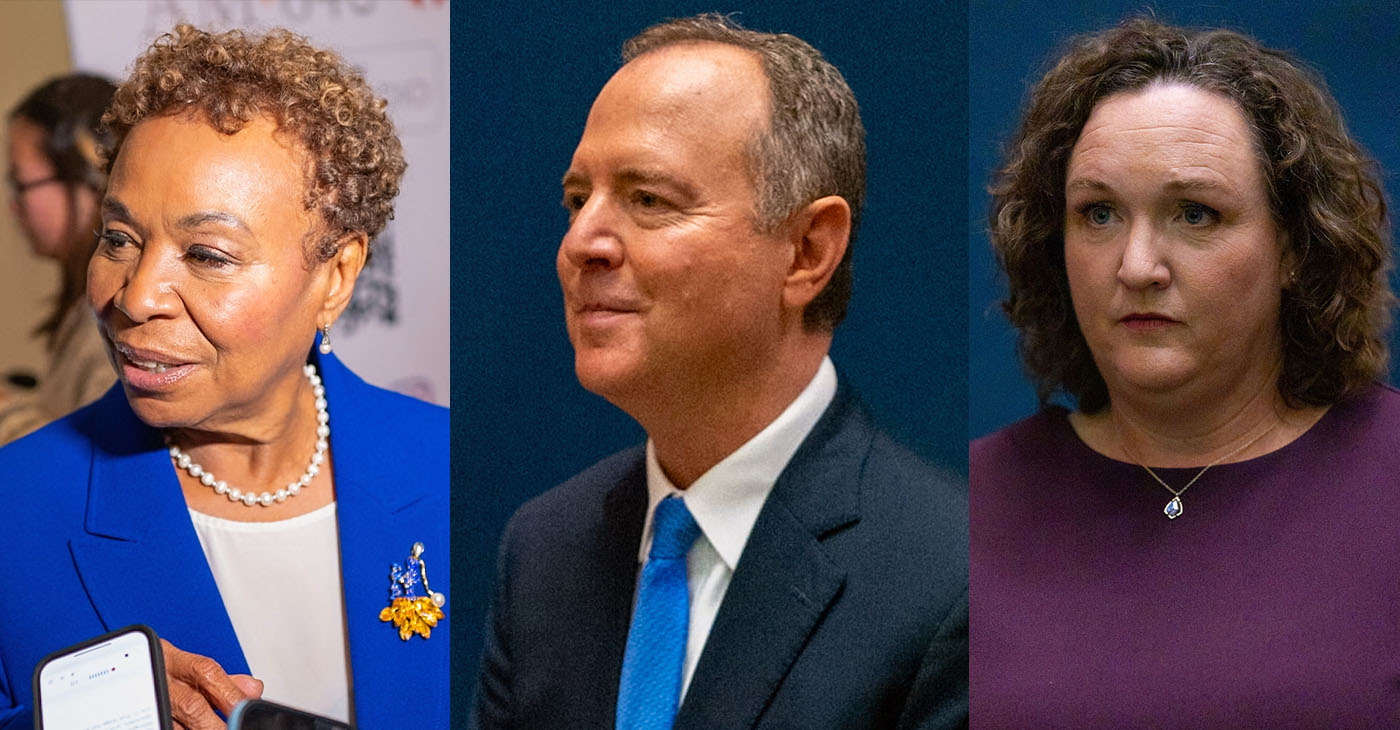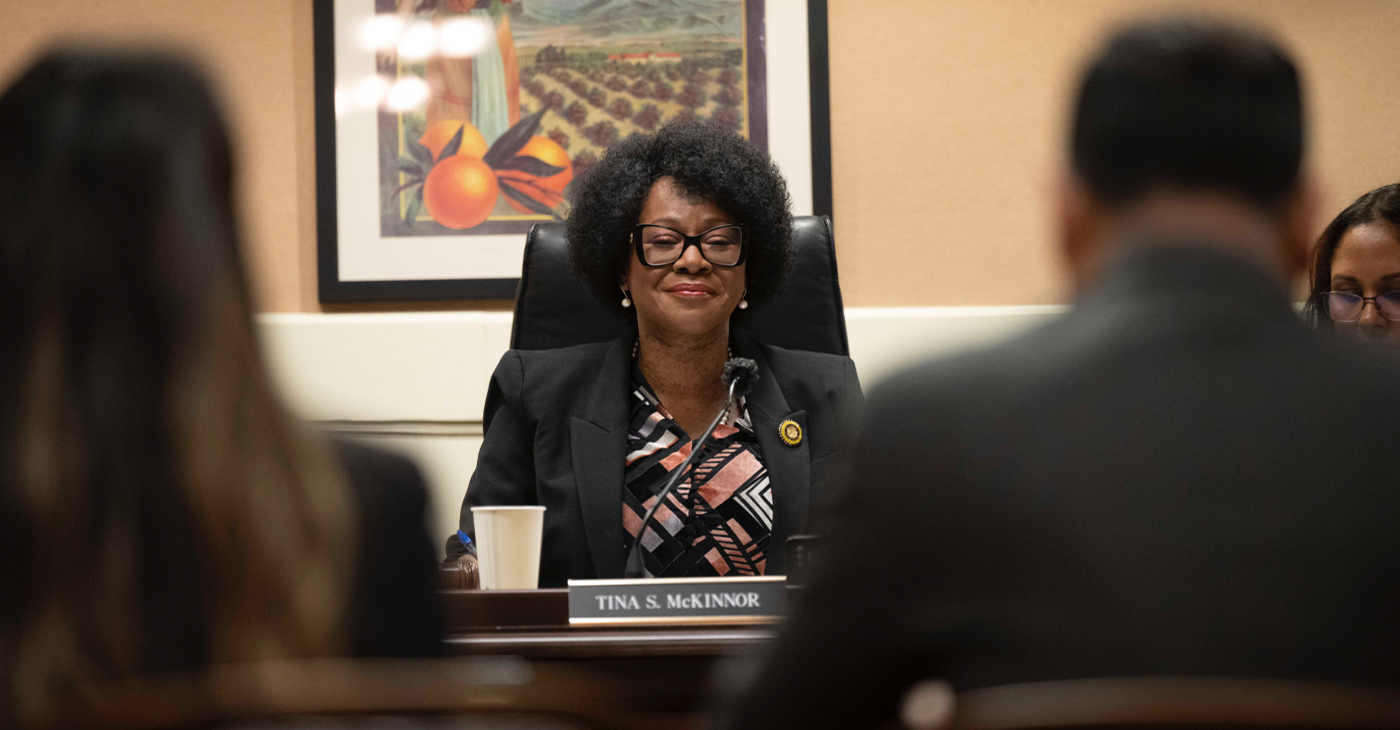California Black Media
California Senate Candidates Discuss Representation in Forum with Ethnic Media
On Feb. 8, the three leading Democratic California Senate candidates participated in a forum to discuss their campaign platforms and field questions from reporters about issues concerning California residents. U.S. Representatives Barbara Lee (D-CA-12), Adam Schiff (D-CA-30), and Katie Porter (D-CA-47) – joined the virtual event that was hosted by California Black Media and Ethnic Media Services.

By California Black Media
On Feb. 8, the three leading Democratic California Senate candidates participated in a forum to discuss their campaign platforms and field questions from reporters about issues concerning California residents.
U.S. Representatives Barbara Lee (D-CA-12), Adam Schiff (D-CA-30), and Katie Porter (D-CA-47) – joined the virtual event that was hosted by California Black Media and Ethnic Media Services.
An invitation was extended to former Major League Baseball player and Republican Steve Garvey to the participate but there was no response from his staff.
It is likely that one of the three candidates that took part in the forum will be California’s next junior senator, serving alongside senior Sen. Alex Padilla. That person will replace Sen. Laphonza Bulter, who is currently the only Black woman in the 100-member U.S. Senate.
One of the questions directed to all the candidates was about how they would ensure that Black women’s voices would continue to be considered in national debates and policymaking.
Lee said Black women legislators “fight for everyone.”
“It is important that they serve in the Senate to have that perspective or that lens that would be missing in the United States Senate,” Lee said, talking about the point of view of Black women, who are the Democratic Party’s most loyal voting bloc.
“It is ‘not just on issues of racial justice, it’s also on issues of equity, economic equity. When you look at billionaires, we have to pass legislation which I’m championing with Senator Sanders, the oligarch Act, the CEO compensation act — bills that will force billionaires to pay their fair share,” said Lee. “A black woman’s perspective on every single issue is very important.”
Porter said she would “work tirelessly” to make sure that Butler would not be the last Black female Senator when she finishes the interim term. Gov. Gavin Newsom appointed Butler after longtime Senator Dianne Porter said California’s next senator needs to be “a champion for communities of color, particularly for Black Americans.
“Washington has long overlooked the needs of hard-working Americans, especially communities of color, including long standing racial gaps in homeownership and education and healthcare. We know that Black Americans have worse health outcomes. They’re less likely to graduate from college. They’re more likely to live in polluted neighborhoods. The question is what is Washington going to do about that?” asked Porter.
Schiff took a different approach to the question. He intends to appoint more Black women and people of color to the judiciary, cabinet positions, and intelligence community such as the Central Intelligence Agency (CIA) and the National Security Agency (NSA).
“In every aspect of policy, and every appointment I have to make, I want to make sure that we’re elevating people that look like America, that will be representative of every community in America,” Schiff said. “And that very much means Black women and Black men, people from the Latino community and the AAPI community, people in the LGBTQ community as well.”
Reporters from CBM, EMS, India Currents, and La Opinion formulated the questions for the briefing.
The candidates also fielded questions about the border crisis, funding Ukraine funding, single-payer health insurance, the expansion of the Federal Child Tax Credit, sponsoring bills to protect local journalism, legal immigration relief to essential undocumented workers, legal immigration relief to essential undocumented workers, climate change, reparations for Black Californians, among other topics.
Activism
Oakland Post: Week of April 24 – 30, 2024
The printed Weekly Edition of the Oakland Post: Week of April 24 – 30, 2024

To enlarge your view of this issue, use the slider, magnifying glass icon or full page icon in the lower right corner of the browser window. ![]()
Business
Black Business Summit Focuses on Equity, Access and Data
The California African American Chamber of Commerce hosted its second annual “State of the California African American Economy Summit,” with the aim of bolstering Black economic influence through education and fellowship. Held Jan. 24 to Jan. 25 at the Westin Los Angeles Airport Hotel, the convention brought together some of the most influential Black business leaders, policy makers and economic thinkers in the state. The discussions focused on a wide range of economic topics pertinent to California’s African American business community, including policy, government contracts, and equity, and more.

By Solomon O. Smith, California Black Media
The California African American Chamber of Commerce hosted its second annual “State of the California African American Economy Summit,” with the aim of bolstering Black economic influence through education and fellowship.
Held Jan. 24 to Jan. 25 at the Westin Los Angeles Airport Hotel, the convention brought together some of the most influential Black business leaders, policy makers and economic thinkers in the state. The discussions focused on a wide range of economic topics pertinent to California’s African American business community, including policy, government contracts, and equity, and more.
Toks Omishakin, Secretary of the California State Transportation Agency (CALSTA) was a guest at the event. He told attendees about his department’s efforts to increase access for Black business owners.
“One thing I’m taking away from this for sure is we’re going to have to do a better job of connecting through your chambers of all these opportunities of billions of dollars that are coming down the pike. I’m honestly disappointed that people don’t know, so we’ll do better,” said Omishakin.
Lueathel Seawood, the president of the African American Chamber of Commerce of San Joaquin County, expressed frustration with obtaining federal contracts for small businesses, and completing the process. She observed that once a small business was certified as DBE, a Disadvantaged Business Enterprises, there was little help getting to the next step.
Omishakin admitted there is more work to be done to help them complete the process and include them in upcoming projects. However, the high-speed rail system expansion by the California High-Speed Rail Authority has set a goal of 30% participation from small businesses — only 10 percent is set aside for DBE.
The importance of Diversity, Equity and Inclusion (DEI) in economics was reinforced during the “State of the California Economy” talk led by author and economist Julianne Malveaux, and Anthony Asadullah Samad, Executive Director of the Mervyn Dymally African American Political and Economic Institute (MDAAPEI) at California State University, Dominguez Hills.
Assaults on DEI disproportionately affect women of color and Black women, according to Malveaux. When asked what role the loss of DEI might serve in economics, she suggested a more sinister purpose.
“The genesis of all this is anti-blackness. So, your question about how this fits into the economy is economic exclusion, that essentially has been promoted as public policy,” said Malveaux.
The most anticipated speaker at the event was Janice Bryant Howroyd known affectionately to her peers as “JBH.” She is one of the first Black women to run and own a multi-billion-dollar company. Her company ActOne Group, is one of the largest, and most recognized, hiring, staffing and human resources firms in the world. She is the author of “Acting Up” and has a profile on Forbes.
Chairman of the board of directors of the California African American Chamber of Commerce, Timothy Alan Simon, a lawyer and the first Black Appointments Secretary in the Office of the Governor of California, moderated. They discussed the state of Black entrepreneurship in the country and Howroyd gave advice to other business owners.
“We look to inspire and educate,” said Howroyd. “Inspiration is great but when I’ve got people’s attention, I want to teach them something.”
California Black Media
Asm. Tina McKinnor Elected Chair of L.A. Delegation to Legislature
On Jan. 24, the members of the Los Angeles County Delegation (LACD) to the California Legislature elected Assemblymember Tina McKinnor (D-Inglewood) as the group’s chair. McKinnor, who is a member of the California Legislative Black Caucus, will lead the 39-member body, which is comprised of 15 State Senators and 24 State Assemblymembers representing various areas of Los Angeles County.

By California Black Media
On Jan. 24, the members of the Los Angeles County Delegation (LACD) to the California Legislature elected Assemblymember Tina McKinnor (D-Inglewood) as the group’s chair.
McKinnor, who is a member of the California Legislative Black Caucus, will lead the 39-member body, which is comprised of 15 State Senators and 24 State Assemblymembers representing various areas of Los Angeles County.
As LACD chair, McKinnor succeeds Assemblymember Luz Rivas (D-San Fernando Valley).
“I am grateful for the trust legislators from the Los Angeles County Delegation have placed in me to serve as its next Chair,” said McKinnor in a statement.
LACD Vice Chair, Sen. Maria Elena Durazo (D-Los Angeles), said the body, which collectively represents about 10 million people in California’s populous county, is the largest, bi-partisan, and most diverse delegation in the California Legislature.
“Heading into a challenging budget year, the Delegation, and I will be intensely focused on making sure communities throughout Los Angeles County receive the services they need and that we continue our historic investments to address homelessness and the housing affordability crisis in Los Angeles County,” Durazo added.
McKinnor thanked Rivas for her stewardship of the LACD during the last legislative session.
“The Delegation and I are grateful to outgoing Chair, Assemblymember Luz Rivas, for her incredible leadership to the Legislature, the state, and especially the people of Los Angeles County,” said McKinnor.
-

 Activism4 weeks ago
Activism4 weeks agoOakland Post: Week of March 27 – April 2, 2024
-

 #NNPA BlackPress4 weeks ago
#NNPA BlackPress4 weeks agoBeloved Actor and Activist Louis Cameron Gossett Jr. Dies at 87
-

 Community1 week ago
Community1 week agoFinancial Assistance Bill for Descendants of Enslaved Persons to Help Them Purchase, Own, or Maintain a Home
-

 Activism3 weeks ago
Activism3 weeks agoOakland Post: Week of April 3 – 6, 2024
-

 Business1 week ago
Business1 week agoV.P. Kamala Harris: Americans With Criminal Records Will Soon Be Eligible for SBA Loans
-

 Activism2 weeks ago
Activism2 weeks agoOakland Post: Week of April 10 – 16, 2024
-

 Community1 week ago
Community1 week agoAG Bonta Says Oakland School Leaders Should Comply with State Laws to Avoid ‘Disparate Harm’ When Closing or Merging Schools
-

 Community6 days ago
Community6 days agoOakland WNBA Player to be Inducted Into Hall of Fame





















































